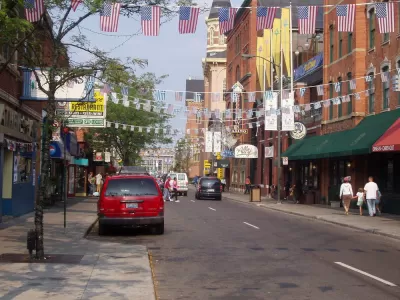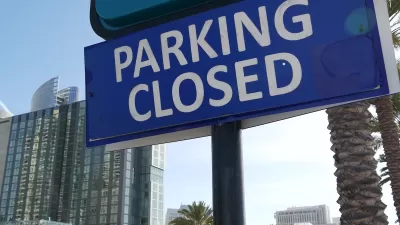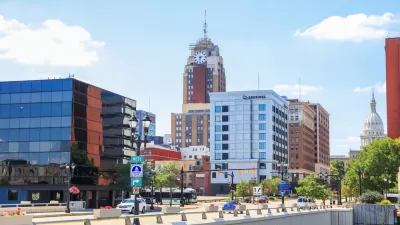The city will invest $9 million in an initiative to build customer parking on city-owned lots to boost economic development.

Writing in Bridge Detroit, Malachi Barrett describes a new effort by the city of Detroit to provide additional parking for small businesses, citing claims of negative impacts on local retail. “A 2018 Detroit Economic Growth Corp. report recommended expanding on-street parking in several commercial corridors, arguing that inaccessible or poorly designed parking lots negatively impact the development of retail businesses,” Barrett explains.
“Detroit planning officials said over the next two years, vacant land owned by the city or Detroit Land Bank Authority will be converted into small surface parking lots adjacent to commercial corridors,” estimated to amount to roughly 400 new parking spots at a cost of $9 million funded through the American Rescue Plan Act.
According to Barrett, “Parking expansion also has been a theme in the city’s ongoing Strategic Neighborhood Fund planning process.” Beth Kmetz-Armitage, deputy group executive for planning, housing and development for the mayor’s office, added the lots “will be well-lit and accessible with standards set by the American with Disabilities Act.”
The article lists several city-owned sites that have been identified as locations for additional parking. Some include buildings that would need to be demolished to build parking.
FULL STORY: Detroit to invest $9M in parking lots for neighborhood businesses

Study: Maui’s Plan to Convert Vacation Rentals to Long-Term Housing Could Cause Nearly $1 Billion Economic Loss
The plan would reduce visitor accommodation by 25,% resulting in 1,900 jobs lost.

North Texas Transit Leaders Tout Benefits of TOD for Growing Region
At a summit focused on transit-oriented development, policymakers discussed how North Texas’ expanded light rail system can serve as a tool for economic growth.

Why Should We Subsidize Public Transportation?
Many public transit agencies face financial stress due to rising costs, declining fare revenue, and declining subsidies. Transit advocates must provide a strong business case for increasing public transit funding.

How Community Science Connects People, Parks, and Biodiversity
Community science engages people of all backgrounds in documenting local biodiversity, strengthening connections to nature, and contributing to global efforts like the City Nature Challenge to build a more inclusive and resilient future.

Alabama: Trump Terminates Settlements for Black Communities Harmed By Raw Sewage
Trump deemed the landmark civil rights agreement “illegal DEI and environmental justice policy.”

Dear Tesla Driver: “It’s not You, It’s Him.”
Amidst a booming bumper sticker industry, one writer offers solace to those asking, “Does this car make me look fascist?”
Urban Design for Planners 1: Software Tools
This six-course series explores essential urban design concepts using open source software and equips planners with the tools they need to participate fully in the urban design process.
Planning for Universal Design
Learn the tools for implementing Universal Design in planning regulations.
City of Santa Clarita
Ascent Environmental
Institute for Housing and Urban Development Studies (IHS)
City of Grandview
Harvard GSD Executive Education
Toledo-Lucas County Plan Commissions
Salt Lake City
NYU Wagner Graduate School of Public Service





























